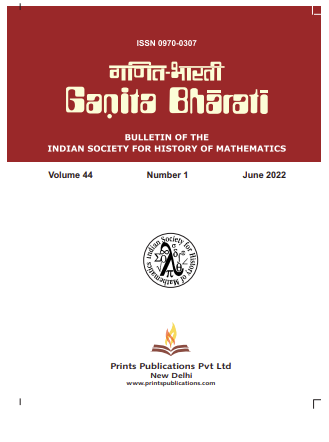Ganita Bharati
Published in Association with Bulletin of The Indian Society for History of Mathematics
Current Volume: 45 (2023 )
ISSN: 0970-0307
Periodicity: Half-Yearly
Month(s) of Publication: June & December
Subject: Mathematics
DOI: https://doi.org/10.32381/GB
Online Access is Free for Life Member
Fifteenth-century Italian symbolic algebraic calculation with four and five unknowns
By : Jens Hoyrup
Page No: 55-86
Abstract
The present article continues an earlier analysis of occurrences of two algebraic unknowns in the writings of Fibonacci, Antonio de’ Mazzinghi, an anonymous Florentine abbacus writer from around 1400, Benedetto da Firenze and another anonymous Florentine writing some five years before Benedetto, and Luca Pacioli. Here I investigate how in 1463 Benedetto explores the use of four or five algebraic unknowns in symbolic calculations, describing it afterwards in rhetorical algebra; in this way he thus provides a complete parallel to what was so far only known (but rarely noticed) from Michael Stifel’s Arithmetica integra (1544) and Johannes Buteo’s Logistica (1559). It also discusses why Benedetto may have seen his innovation as a merely marginal improvement compared to techniques known from Fibonacci’s Liber abbaci, therefore failing to make explicit that he has created something new.
Author :
Jens Hoyrup
Roskilde University, Section for Philosophy and Science Studies, Denmark.
DOI: https://doi.org/10.32381/GB.2020.42.1-2.3




